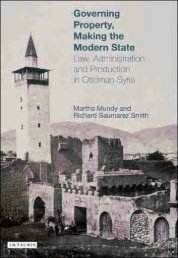The Young Turk Period, 1908-1918 - PSI424
The Young Turk Period, 1908-1918 - PSI424
The Young Turk Period, 1908-1918 - PSI424
You also want an ePaper? Increase the reach of your titles
YUMPU automatically turns print PDFs into web optimized ePapers that Google loves.
282 <strong>The</strong> Rise of Modern <strong>Turk</strong>ey, 1808-1975<br />
tance that followed the arrival of the Operation Army. Military officers were sent<br />
to the provinces to collect taxes so that the government could carry on. Thus, in<br />
the name of the Constitution and democracy the army assumed autocratic control. 20<br />
<strong>The</strong> final step came three days later. On April 27 Parliament again met as the<br />
National Public Assembly, this time at the Aya Sofya mosque and under Sait Pa§a's<br />
chairmanship. Obtaining a fetva that justified the sultan's deposition on the grounds<br />
of complicity in the counterrevolution and the deaths that resulted, as well as of<br />
the theft of state funds, the National Assembly declared him deposed in favor of his<br />
brother, Mehmet V Re§at. 21 <strong>The</strong> sultan and his family were immediately placed<br />
on a special train and sent to Salonica the same night so that the next morning the<br />
public and the sultan's supporters were presented with a fait accompli against which<br />
there could be no real opposition. After 33 years on the throne, then, still now only<br />
in his 66th year, Abdulhamit accepted the events as the will of God and lived on<br />
quietly in Salonica until he was recalled to Istanbul in 1912 due to the fear that he<br />
might fall to the enemy in the Balkan Wars. He then resided in the Beylerbeyi<br />
Palace, on the Anatolian side of the Bosporus, until his death six years later, on<br />
February 10, <strong>1918</strong>. Thus ended in obscurity and disgrace the life of one of the most<br />
eminent of all Ottoman sultans. 22<br />
<strong>The</strong> Ottoman Constitutional Democracy, 1909-1911<br />
It long has been assumed that the revolutions of <strong>1908</strong> and 1909 ushered in a period<br />
of direct rule by the CUP. However mistaken this assumption was for Abdulhamit's<br />
last year of power, it was even less true in the period of constitutional democracy<br />
that followed until the disastrous war with Italy in Tripolitania. As we have seen,<br />
the counterrevolution of April 1909 disrupted and scattered the CUP and its<br />
supporters, and it was the senior officers of the Macedonian army who restored the<br />
Parliament and deposed Abdulhamit to preserve order. This in turn inaugurated<br />
not a new period of CUP dominance but, rather, a mainly constitutional and<br />
democratic regime influenced from behind the scenes by Mahmut §evket Pa§a, who<br />
became martial-law commander of Istanbul as well as inspector of the First, Second,<br />
and Third armies, thus inaugurating a limited kind of army participation in politics<br />
that has been exercised from time to time ever since.<br />
In response, the CUP itself emerged mainly as a civilian political party. It worked<br />
to restore its previous authority by developing an empire-wide membership and<br />
political organization as well as a program that could appeal to the masses. So it<br />
was that while its first congress, held in Salonica in <strong>1908</strong>, was secret, with its public<br />
statement still limited to support of the as yet unstated aims of the Macedonian<br />
CUP, the one held on November, 13, 1909, and all subsequent party congresses<br />
were quite public. <strong>The</strong> secret "patriotic clubs" previously established in the provincial<br />
centers now openly emerged as its party centers, all, however, still under the<br />
strong control of its leaders in Istanbul and Salonica. Its military members did not<br />
participate actively in politics, but their influence still was felt from behind the<br />
scenes. <strong>The</strong> CUP program was strongly secularist and reflective of the modernist<br />
policies of the intellectuals. It favored the existing organization of Parliament, with<br />
a Chamber of Notables partly appointed by the sultan and partly by the Chamber of<br />
Deputies. <strong>The</strong> vote was to be given to Ottoman male subjects over the age of 20<br />
who possessed some property. Elections still would be indirect, but article 113 would<br />
be abolished altogether. All Ottomans would be equal before the law, free to<br />
assemble publicly and discuss political issues as long as the public order was not












